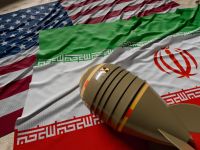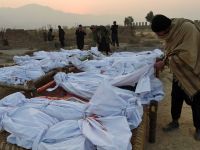At a time when limited world supplies have sent oil prices rocketing to 10 year highs, the enormous production potential of Iraq is crippled by decade-old UN sanctions.
Iraq is obliged to sell its crude in exchange for basic goods and medicines under the UN oil-for-food programme as part of the punishment for invading Kuwait in 1990.
Iraq desperately wants to boost production and has even set a target of double its current three million barrels per day (bpd).
But before setting off for the OPEC ministers' meeting which opens Sunday in Vienna where production quotas are expected to be increased, Oil Minister Amer Rashid said Iraq opposed any output hike by the cartel and attacked Saudi Arabia for quota busting to try to bring down prices.
Baghdad badly needs the maximum return from oil revenues under the oil-for-food scheme and at the same time is working to increase its production, which does not fall under OPEC's quota system.
TotalFinaElf chairman Thierry Desmarest this week pointed out that Iraqi oil could cool the markets at a time when most other OPEC members do not have spare production capacity.
But the head of the world's fourth largest oil corporation admitted that sanctions would have to be lifted first and Iraq's industrial infrastructre updated.
Iraq has reserves of 112 billion barrels, the largest in the world after Saudi Arabia. Some 2.5 million barrels of current daily production is exported under the UN regime set up in 1996 to alleviate suffering caused by sanctions.
Baghdad had an OPEC quota of 3.14 million bpd before the Gulf War but has pledged to reach six million bpd. This would require investments estimated at 30 billion dollars.
"If Iraq produced more it could indeed have an impact on the markets, bringing down prices if there is enough crude supply or stabilising them in the event of price swings," said oil expert Naji Abi Aad of the Mediterranean Energy Observatory based in France.
He noted that historically Iraq has never produced more than 3.5 million bpd and any major increase today depends of domestic political factors as well as the international embargo.
"What's more you need to know the real capacity of Iraqi (oil) fields because the figure of six million bpd is only theoretical at the moment," he cautioned.
In recent years Iraq has signed several contracts, particularly with Russian and Chinese firms, to develop its oil fields but work cannot be carried out until sanctions are lifted.
The UN Security Council in May doubled to 1.2 billion dollars the amount Iraq can spend on renovating oil infrastructure each year under the oil-for-food programme.
But Iraq complains bitterly of delays in the arrival of hundreds of millions of dollars of supplies, which have to be vetted by the UN sanctions committee, and accuses the United States and Britain of blocking contracts with foreign suppliers.
According to the United Nations, Iraq has sold more than 37.47 billion dollars worth of crude -- more than two billion barrels - under the scheme.
Baghdad exports through a pipeline to Turkey, through the Gulf terminal of Mina al-Bakr and via road to Jordan.—AFP.
©--Agence France Presse.
© 2000 Mena Report (www.menareport.com)







